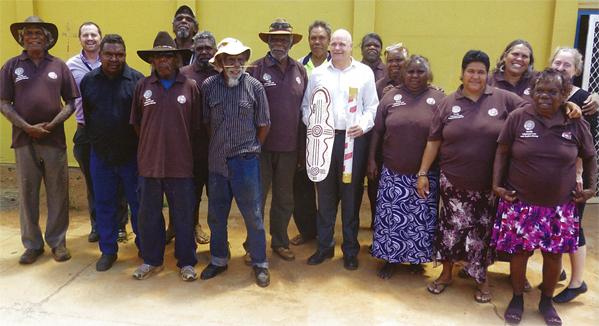
Dr Thalia Anthony is passionate about the role of Indigenous community courts in the Northern Territory. The UTS:Law Senior Lecturer is an expert in the area of Indigenous criminalisation and Indigenous community justice mechanisms.
Community courts are distinct from mainstream courts in many respects; for instance Indigenous Elders deliberate over the criminal sentence in conjunction with the Magistrate; evidence raised by the Elders is not required to be given on notice, and defendants are dealt with in accordance with community values. Evidence shows that they strengthen the community and provide Indigenous defendants with a standard of individualised justice comparable to that of non-Indigenous defendants.
Dr Anthony recently attended the Criminal Lawyers Association of the Northern Territory (CLANT) 15th Bail Conference, Curing Justice. Conference participants included the Northern Territory Chief Justice, the Northern Territory Attorney-General and criminal lawyers from across Australia and the UK. There she presented, with Will Crawford of the North Australian Aboriginal Justice Agency (NAAJA), a paper on the benefits flowing from Northern Territory Indigenous community sentencing mechanisms, particularly in terms of individualised justice for the offender, engaging the victim and empowering Indigenous communities.
Her paper was praised for addressing practical legal issues in the Northern Territory in a scholarly manner. Dr Anthony was encouraged to explore the capacity for Indigenous input in the production of pre-sentencing information in other jurisdictions.

Dr Anthony says that building confidence in the role of Indigenous community courts is essential to the community, not only for the sake of substantive equality, but because “in order to achieve individualised justice, Indigenous communities such as those in the Northern Territory need to be able to work with the criminal justice system in a positive way.” While some evidence suggests that Indigenous input has little effect on recidivism, Dr Anthony says that studies need to be based on a comparable cohort of offenders in the same community. She is planning to undertake such research with NAAJA.
Studies also need to identify “benefits to victims in terms of healing, the types of reoffending that occurs, which may be of a substantially different nature”, she says. She particularly points to evidence that Indigenous sentencing courts have had an important role in reducing the recurrence of family violence reoffending.
Due to the cohesiveness of a number of Northern Territory communities, they are well suited to dealing with problems in a more culturally appropriate process. The first challenge, however, is to provide strong evidence that encourages the courts to reinstate and support Indigenous input, which ceased in 2011, following a decision of the Chief Magistrate of the Northern Territory. Dr Anthony’s research and publications, which have featured in the Australian Indigenous Law Review and Balance-The Journal of the Northern Territory Law Society, and ongoing collaborations with NAAJA are part of this process. She is also undertaking a pilot project to examine Indigenous contributions to pre-sentence information in NSW and Victoria.
Story by: Rebecca Brediceanu
Photo top right: Indigenous Sentencing Magistrates farwewell, published in Balance, Law Society Northern Territory.
Stay connected with the UTS Faculty of Law for more news and events:

